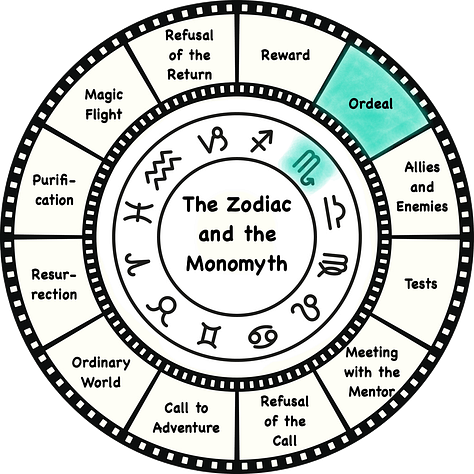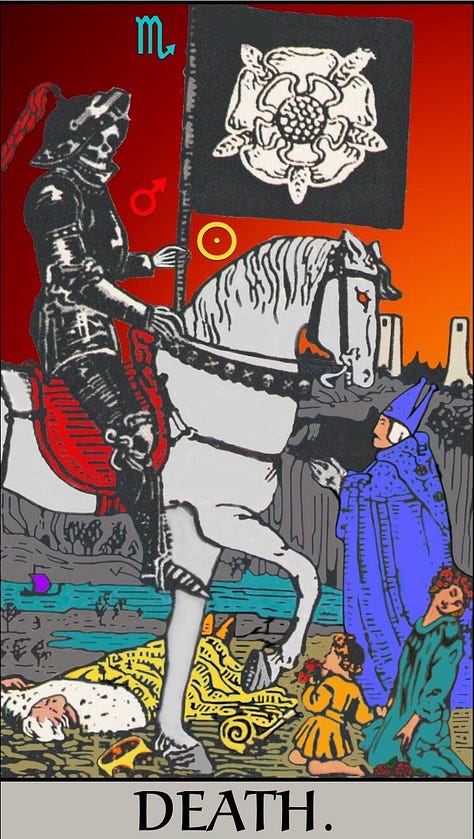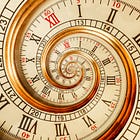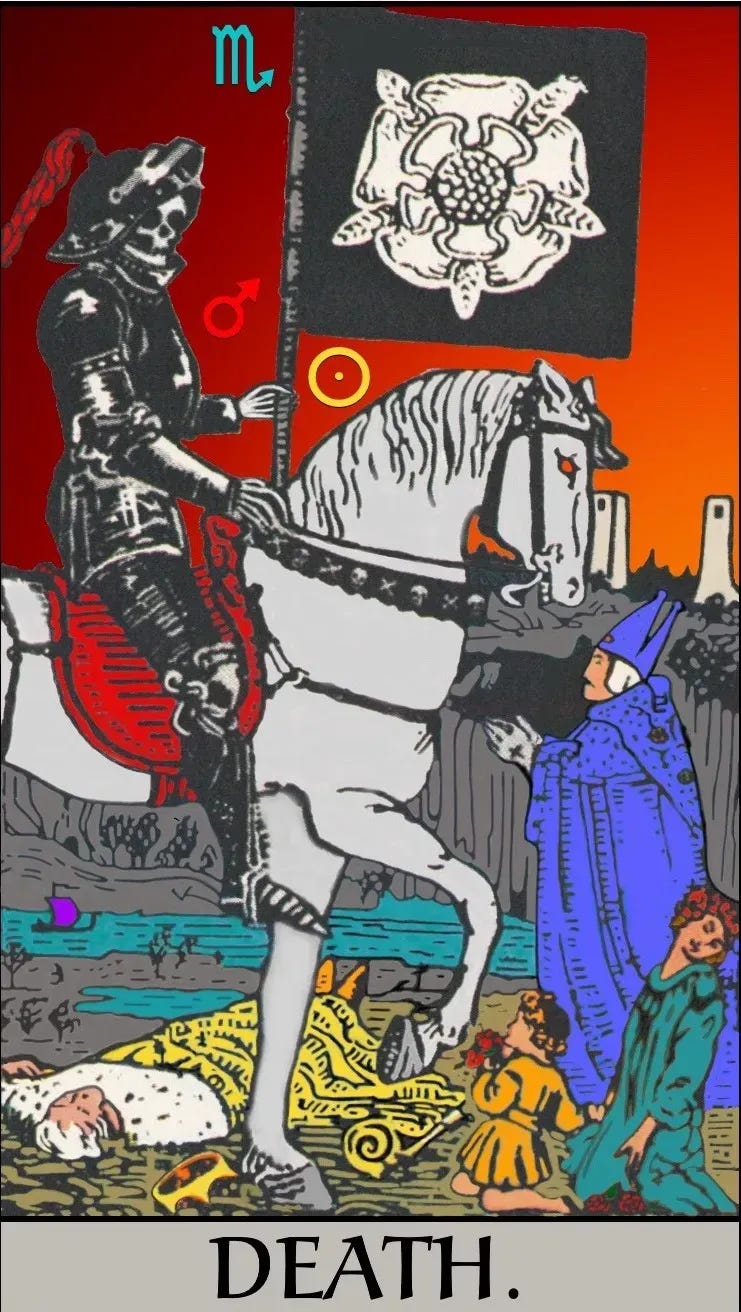Quest for the Elixir
This post is part of an ongoing series. If you’re new to it, you’ll want to read the introduction first (about 6 minutes):



Three Articles About a Chapter of the Universal Story
Each edition of Quest for the Elixir consists of three articles about one of the 12 chapters in the cyclical Universal Story.
The first article is an exploration of the chapter from the perspective of the Hero’s Journey in Joseph Campbell’s monomyth.
The second article is a view of the same chapter in terms of the Zodiac sign corresponding to it in the cycle.
The third article is about the meaning of the chapter as symbolized in a Major Arcana card of the tarot.
During the month of the Sun’s transit through Scorpio, we observe the School Tax chapter of the Universal Story. In celebration, I offer the following three articles:
The Monomyth: The Ordeal
We’ve followed our hero through developmental stages of childhood in the Ordinary World and adulthood in the Special World. Stage by stage, he’s learned about his world and himself, fulfilling his potentials as well as he knew how. All has prepared him (hopefully) for his arrival here at the heart of the Special World, where he must cross another threshold and enter a dark, forbidding, unknown realm for a harrowing encounter with his greatest fear. This time it’s not the Bogeyman; it’s Death.
“Life lives on life. This is the sense of the symbol of the Ouroboros, the serpent biting its tail. Everything that lives lives on the death of something else. Your own body will be food for something else. Anyone who denies this, anyone who holds back, is out of order. Death is an act of giving.” ― Joseph Campbell
Theoretically the hero might have been able to avoid a truly horrific experience here, if only his understanding of Life were deeper, his philosophy wiser. But we don’t pick up on every opportunity to learn life’s lessons, and there are some uncomfortable lessons that we repeatedly avoid, fail to grasp, and forget. — Or so we think, until here in the Ordeal we are confronted with them and forced to rethink our priorities.
“The battlefield is symbolic of the field of life, where every creature lives on the death of another. A realization of the inevitable guilt of life may so sicken the heart, that like Hamlet, or like Arjuna, one may refuse to go on with it. On the other hand, like most of the rest of us, one may invent a false, finally unjustified image of oneself as an exceptional phenomenon in the world — not guilty as others are, but justified in one's inevitable sinning, because one represents the good. Such self-righteousness leads to a misunderstanding, not only of oneself, but of the nature of both Man and the Cosmos. The goal of the myth is to dispel the need for such life-ignorance by effecting a reconciliation of the individual consciousness with the universal will, and this is effected through a realization of the true relationship of the passing phenomena of time to the imperishable life that lives and dies in all.” ― Joseph Campbell, The Hero With a Thousand Faces
Life on earth is ultimately a ‘school’ of awareness. It’s a truth-or-consequences school, with clues to truth everywhere, and consequences for cluelessness when ‘test’ time rolls around at harvest’s end. What shall we reap now? Consequences or truth? Trick or treat?
Have we not partaken of the treasures of the material world? Have we not understood that we only borrowed them from the universe temporarily? That even our physical body is mortal and impermanent? That it, and all of our material possessions, are ultimately illusions? That our emotional ‘programming’ is equally illusory, flowing and changing, no more stable than water in our hands? Have we identified too much with our proud, imperial ego, clinging in vain to such illusions, blithely thinking to possess and reign over them forever as King or Queen of Everything? Too bad, because however royal a mortal may be on earth, none ever reigns beyond his or her natural season.
The time of the Ordeal is ‘tax’ time, when borrowed illusions are reclaimed in natural decay without exemption, and when the ego-king who clings to them must die (transform), lest they corrupt him. So when Death comes to call, let us surrender illusory treats to the wandering ghosts with whom they belong. Let us do so cheerfully, lest we suffer tricks. And thenceforth may we rest in peace.
“The hero of yesterday becomes the tyrant of tomorrow, unless he crucifies himself today.” — Joseph Campbell
“Wars and temper tantrums are the makeshifts of ignorance; regrets are illuminations that come too late.” ― Joseph Campbell, The Hero With a Thousand Faces
Although the Ordeal, or “Big Battle”, is a place of pain and loss for the hero of the monomyth, he actually stands to gain much more than he loses here. For as he surrenders to the inevitability of his physical and emotional mortality, he may recognize the living spiritual essence of himself that is not mortal at all. As he drops dispensable false values, he awakens to true but unrecognized potentials within himself, potent abilities (not things or hollow forms) that he never knew were his own to develop.
What remains to us after our personal Ordeal? Our immortal inner witness remains to celebrate ongoing life and move on with less ‘baggage’. Traveling more lightly, we are free to see and do more.
The experience of the Ordeal comes down to is this:
Material and emotional illusions grow heavy. When they become useless and too heavy to bear, let them fall.
Spiritual and mental energies are light. When they are free of concern for useless burdens, let them rise.
“The cave you fear to enter holds the treasure you seek.” ― Joseph Campbell
So in this present stage of the monomyth, beyond the crossing of the threshold out of day and into night, the eerie path our hero walks is the “Approach to the Inmost Cave”, where the fateful Ordeal, or Big Battle, awaits. Knowing he’s unlikely to survive it intact, he would rather be anywhere else. But he doesn’t have a choice; this stage of the story doesn’t allow him to opt out.
“In mythology the Inmost Cave may represent the land of the dead. The hero may have to descend into hell to rescue a loved one (Orpheus), into a cave to fight a dragon and win a treasure (Sigurd in Norse myth), or into a labyrinth to confront a monster (Theseus and the Minotaur) …. In the Arthurian stories the Inmost Cave is the Chapel Perilous, the dangerous chamber where the seeker may find the [Holy] Grail.” — Christopher Vogler, The Writer’s Journey
Likewise in modern mythology, Luke Skywalker must go into the Death Star to face Darth Vader and rescue Princess Leia (Star Wars), and in another story Indiana Jones must confront whatever may lurk in the Temple of Doom.
As the hero (and/or any companions) approaches the fearsome Cave, he often pauses at the gate to make preparations, including a plan to elude any guards that may threaten to attack him or bar his way. Then he proceeds to penetrate the villain’s lair.
“The black moment is the moment when the real message of transformation is going to come. At the darkest moment comes the light.” ― Joseph Campbell
To his horror, the hero soon finds himself face to face with his hated and dreaded archenemy — his shadow — and utterly terrified. No longer can he ignore it or run away from it.
"Real liberation comes not from glossing over or repressing painful states of feeling, but only from experiencing them to the full." - Carl Jung
His only hope is to grasp the truth of his situation from a new perspective and respond accordingly. Never mind personal pride! What’s really important here? Where should he focus his energies? Where is the real life that he needs to defend, and what’s an expendable whim?
“..enlarge the pupil of the eye, so that the body with its attendant personality will no longer obstruct the view. Immortality is then experienced as a present fact...”
― Joseph Campbell, The Hero With a Thousand Faces
In the hero’s frantic desperation to know the truth, he sees it, and realizes that he has nothing real to lose. His supposed external '‘enemy” is a mere illusion. His real enemy is an offended part of himself that he’s rejected, neglected, and assigned unconsciously to someone or something else. He must act immediately to redeem and own his rightful but undeveloped power from his illusory shadow. When he does so, his “enemy” vanishes (or is ‘swallowed’), and his ordeal is over.
"The hero, whether god or goddess, man or woman, the figure in a myth or the dreamer of a dream discovers and assimilates his opposite (his own unsuspected self) either by swallowing it or by being swallowed." ~ Joseph Campbell
The meaning of the Ordeal can be summarized in the following quotes:
“Perhaps some of us have to go through dark and devious ways before we can find the river of peace or the highroad to the soul's destination.” ― Joseph Campbell, The Hero With a Thousand Faces
“Opportunities to find deeper powers within ourselves come when life seems most challenging.” ― Joseph Campbell
"The descent into the depths always seems to precede the ascent." — Carl Jung
"One can experience an unconditional affirmation of life only when one has accepted death, not as contrary to life, but as an aspect of it." ~ Joseph Campbell
“And so every one of us shares the supreme ordeal —carries the cross of the redeemer— not in the bright moments of his tribe's great victories, but in the silences of his personal despair.” ― Joseph Campbell, The Hero With a Thousand Faces
“Tragedy is an unfinished comedy.” ― Joseph Campbell, The Hero With a Thousand Faces
“If you are falling....dive.” ― Joseph Campbell
The Ordeal in The Wizard of Oz
We last saw Dorothy and her companions in the Emerald City, preparing to present themselves at their best for their long-desired audience with the Wizard of Oz. Now at last they they gain admittance to the Wizard’s palace.
Soon they discover that the fulfillment of their requests will require much more of them than they have anticipated. As they approach the Wizard under the high, imposing arches of a long, stark hallway, their nervousness intensifies. Then, instead of extending the congenial welcome they are expecting, the Wizard attacks each of them with a terrifying insult in a thunderous voice.
At first they are all intimidated. But when Dorothy sees the Cowardly Lion utterly overwhelmed, she shows spontaneously some of the courage the Lion seeks in her angry response to the Wizard.
The Wizard isn’t going to grant the companions boons in response to mere requests. They must earn their own rewards, or gain nothing. Now that Dorothy has shown some spirit, they’re ready for the frightening challenge that awaits them. With no other option, they set out on their fearsome mission.
Minions of the wicked Witch of the West attack the companions. The Scarecrow is torn apart, while Dorothy and her dog Toto are abducted.
The Lion and the Tin Man hastily re-stuff the Scarecrow with his scattered straw (help him gather his thoughts) so that they can work together to rescue Dorothy.
Captive in the Witch’s castle, Dorothy now comes face to face with her nemesis, the Witch of the West, who orders a minion to drown poor Toto. When Dorothy begs for Toto’s life, the Witch tries to bargain with her for the precious Ruby Slippers. Now Dorothy’s priorities are clearer than ever. Though she wants to keep the slippers, she quickly agrees to surrender them in order to save Toto.
But the Witch can’t take the Ruby Slippers without killing Dorothy. So while preparations for her murder are being made, Dorothy is trapped alone with her terror and an hourglass measuring the remaining minutes of her life. Meanwhile Toto, who has managed to escape, races to find her companions.
The Tin Man feels sad for Dorothy’s plight, and the Lion, though motivated to help Dorothy, doesn’t know how and is still afraid. But the unknowingly clever Scarecrow comes up with a practical plan that all agree to carry out together.
Infiltrating the castle among the guards, the three rescue Dorothy from her prison. Together they all race for the the castle’s exit.
Unfortunately, the escape effort fails when the Witch captures them all. But something else succeeds unexpectedly.
The Witch’s broomstick is a variant of the Wand, a tool of the intuitive Fire element, with which she keeps trying to incinerate the (Airy/thinking) Scarecrow. But as an illusory figure of the Water element (feeling), the Witch has no right to use the power of Fire, and has only been doing so because Dorothy has allowed it.
When Dorothy douses the Witch with water, she returns the evil illusion to the Water it came from. When she retrieves the broomstick, she takes back the Fire power that she’d been giving away.
Toto is Dorothy’s responsibility. The advice of farmhand “Hunk” (aka The Scarecrow) in an early scene of this movie might have spared Dorothy her whole Ordeal with the Witch, if only she’d thought to make the responsible choice he suggested. “When you come home, don’t go by Miss Gulch’s place”, he said, “then Toto won’t get in her garden, and you won’t get in no trouble.” But no matter. She’s learned her lesson now, and her intuition will never let her make that irresponsible mistake again.
Scorpio
Scorpio is one of the three Water signs, all of which reflect modes of feeling and feeling’s expression in symbolic imagination. While Pisces shapes new dreams of the future, and Cancer savors (or at least gets used to) the feelings of dreams come true, Scorpio surrenders attachments to old dreams whose charge is spent.
The Scorpio style is emotionally intense. Contrary to the need in the opposite sign, Taurus, to keep and preserve, the need in Scorpio is to somehow ‘make a trade’ or ‘strike a deal’. An inevitable struggle is at hand, emotional and sometimes physical. A deeply dreaded loss is certain or probable, yet some kind of important gain seems to be possible. The stakes are enormously high, and the outcome is as yet unknown. What experience could be more suspenseful — or more frightening? What will it cost us? How well have we prepared for it? How might we have prepared?
In an astrological chart, houses represent the various ‘departments’ of life, and the places where they function. The natural house of Scorpio is the 8th house, located in the upper right part of the wheel as shown above. That’s the house of shared resources, including resources belonging to a partner, resources pooled with those of others (investments, insurance, loans, debts, taxes, etc.), and inherited resources (“goods of the dead”), the remains of something lost or taken away. It’s all business in the 8th house. Dead or alive, we pay for what we’ve taken from that house and benefit from what we’ve paid into it.
In the language of astrology, planets function as ‘nouns’ or ‘verbs’ that represent or express the various energies of life. Each sign reflects the qualities of the planet which rules it. The classical ruler of Scorpio is Mars, a Fiery planet that burns freely in Aries, the Fire sign it also rules, but boils the water that meets it here in Water sign Scorpio.
Though Mars doesn’t rule any of the signs between Aries and Scorpio, it propels life at a primitive level through all of them. Here, where we meet Mars again as ruler, I’ll repeat what I wrote about it back in Aries, because the way we’ve been using our Mars energy since Aries affects our experience with it now in Scorpio.
Mars is the primitive ‘fuel’ that powers physical motion: the circulation of blood, the movement of living creatures, the “rat race” for necessities, desire and the “pursuit of happiness” — the vital flow of the ‘river’ of life. Where Mars is, there is fast action, struggle, and/or some inevitable emotional or physical pain, especially that of bloody injuries and fevers. The energy of Mars is urgent and uncomfortable, but we couldn’t live on earth without it.
Mars used to be thought of as a “malefic”, or bad planet. Is Mars essentially evil? No, but it’s primitive, a crude survival instinct. Coming from the awareness of a wild animal or newborn infant, Mars is asocial and concerned only with physical drives and personal desires. That’s not bad in itself, but in humans, at least, it needs to be tempered by social awareness that normally develops through interaction with others. When for whatever reason it isn’t, Mars can turn easily from survival needs to wanton aggression, inciting conflict, vicious competition, exploitation, and violence. That’s negative Mars, and it needs to be prevented from doing harm.
We make the best use of our natural positive Martial energy when we use it constructively. It’s not as though we don’t have enough inevitable trouble to cope with, enough need of productivity, or enough regrettable mistakes that require some kind of reconstruction. Otherwise, we need only take care to avoid harming others in our own “pursuit of happiness”.
We have a choice as to how we handle our encounters with negative Mars. We can participate in an endless exchange of blame and retaliation, or we can fortify our territory and strictly limit our action to vigilant defense. Of course, we have to confirm our choices with actual deeds.
So here, in the intensity and struggle of Scorpio, we learn (or are reminded) that “we reap what we sow”. We may come to regret whatever misuse we may have made of the Martial power we have been wielding in life when we are on the receiving end of our own Martial ways.
Have we used it only for its true purpose, as necessary to our survival? Well and good, for its harsh effects could not have been helped, and the price we pay now is fittingly minimal. Have we used it wantonly, for the satisfaction of our whims, heedless of unnecessary injury we’ve done to others? Then woe is us, for the tax now seized on our foolishness and associated cruelty is appropriately merciless.
Something dies in Scorpio, and Mars is only here to pay the debts and ‘settle the estate’ according to universal truth. So what do we and our heirs (or victims) truly deserve?
Death
The Sun has just set in a blood-red sky. On bare ground near a river, a king in his finery lies dead, his golden crown having fallen from his head into the mud. Nearby, facing the dead king, a woman kneels with her child, a priest standing beside them.
Over the king’s corpse towers a huge pale grey horse, saddled in scarlet. Its ghastly rider, a gaunt white skeleton in black armor, clutches a rein studded with small skulls and bones in one bony hand and a massive flag showing a white rose on a black field in the other.
The priest stands in a prayerful pose, directly facing the grim rider. In the distance a boat can be seen sailing down the river.
The setting of the golden Sun in a blood-red sky is symbolically equivalent to the death of the golden king at the coming of the fatal horseman on his blood-red saddle. A proud and glorious life has ended, just as every mortal life with blood in its veins, however exalted or humble, must end at some time.
The deathly design of the rein in the horseman’s grasp speaks of the many lives he has brought to a halt. The large white rose compensates with a grand proclamation of light from darkness, purity, renewal, and a fresh new beginning yet to come.
The three living witnesses under the gaze of the deathly horseman show three different responses to the tragic loss. The child gazes innocently on the lifeless body, curious perhaps, but accepting the event as simply another among many that he doesn’t understand.
The woman can’t bear to look at the dead king, and is probably in shock. She is the mourner who will suffer emotionally, and perhaps physically, from this tragic loss of someone she has admired and depended upon.
The priest is no stranger to Death, and best equipped to face it. Hopefully he can console the woman, help her to overcome the pain that is so acute in the initial stages of mourning, and impart to her some wise ways to a fresh new perspective.
The ship sails like a mortal life down the flowing river of time. The king’s ship has taken him all the way down to the mouth of the river, to the peace of the cleansing sea. The ships of the others still have more sailing to do, and for a time their lives will go on.
In divination, I read Death as the permanent ending of something in a person’s life (not the physical death of the person). Whatever it was is gone for good, and though the person may take time to mourn it, she/he will have to release attachments to it and adjust to its absence.
If it’s reversed, I read it as the same kind of loss it would mean upright, except that so far the person has failed to let the attachment go. Someone may be missing out on good opportunities in life because she/he is still clinging to something that no longer exists.









